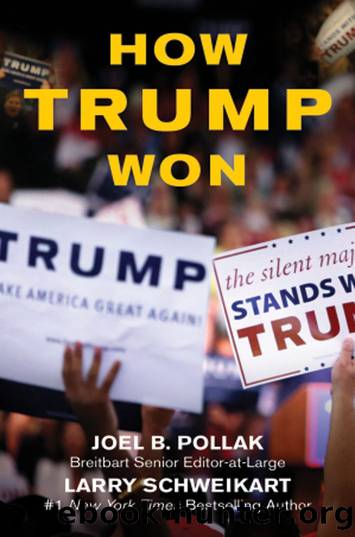How Trump Won by Pollak Joel & Schweikart Larry

Author:Pollak, Joel & Schweikart, Larry
Language: eng
Format: epub
ISBN: 978-1-6215-7538-2
Publisher: Regnery Publishing
Published: 2017-01-16T16:00:00+00:00
STOP TRUMP!
Just before the Iowa caucuses, the flagship of the old line conservative media publications dedicated its entire January 21 issue to stopping the New Yorker. The “Against Trump” issue of National Review was written by more than a dozen leading conservatives including economist Thomas Sowell (who would go on to advise a reluctant vote for Trump in the general election) and talk-show host (and Cruz donor-supporter) Glenn Beck (who would remain #NeverTrump to the end). Each one took Trump to task on a different issue or along different lines. Never in American political history had a leading publication outright rejected the leading figure of its own party. Even at the height of dissatisfaction with Lyndon Johnson, there was nothing comparable: venerable left-wing publications didn’t ditch him for Eugene McCarthy or Bobby Kennedy. The National Review firing squad was a sign of how incredibly desperate the establishment Republicans had become—and how close they were to irrelevance. Another was how the elites were increasingly willing to align themselves with a man they hated almost as much—Ted Cruz. Until Trump was a serious threat to win the Republican nomination, few had ever praised Cruz—their support had much more frequently been directed at Rubio. As the actual voting began, they were hoping against hope that the polls were wrong.
The first test would be in Iowa on February 1, and Trump seemed to be doing well there. But Emerson College’s poll, unlike all others, showed Cruz with a victory there. Iowa is historically an outlier. Very few winners of the Iowa caucus have won the Republican nomination, although Obama won the Democrat caucus and the nomination in 2008. Part of the difficulty with Iowa’s caucus system is that partisans gather in large halls or churches or schools and supporters of the candidates are invited to make brief speeches. In many of these, no Trump advocates had been lined up, and the media stigmatizing of Trump—especially among conservatives—worked to dampen down public expressions of support for him. It is a much different setting from a traditional secret primary vote. Cruz’s vaunted “ground game” had callers and door-knockers getting out his supporters, and there were speakers for him in every location. The previous week, Trump had won the endorsement of conservative darling and former vice presidential nominee Sarah Palin, who spoke at Trump rallies in Iowa, but it was widely agreed that he had not spent the time or the effort recruiting the ground troops necessary to carry the caucuses. Moreover, the Iowa caucus system, with its small gatherings and process of having a person speak to the little crowds on behalf of each candidate, did not play to Trump’s strength. At some locations, he had no one to speak for him, because no one had been recruited.
Even so, on election day, Trump turned out an astounding 38,500 Iowa voters, almost 9,000 more than Rick Santorum had won with four years earlier. But Cruz was supported by a whopping 45,000, shocking the pundits. (Significantly, Republican turnout across the board had spiked from four years earlier.
Download
This site does not store any files on its server. We only index and link to content provided by other sites. Please contact the content providers to delete copyright contents if any and email us, we'll remove relevant links or contents immediately.
| Anarchism | Communism & Socialism |
| Conservatism & Liberalism | Democracy |
| Fascism | Libertarianism |
| Nationalism | Radicalism |
| Utopian |
The Secret History by Donna Tartt(19037)
The Social Justice Warrior Handbook by Lisa De Pasquale(12183)
Thirteen Reasons Why by Jay Asher(8887)
This Is How You Lose Her by Junot Diaz(6873)
Weapons of Math Destruction by Cathy O'Neil(6261)
Zero to One by Peter Thiel(5784)
Beartown by Fredrik Backman(5734)
The Myth of the Strong Leader by Archie Brown(5495)
The Fire Next Time by James Baldwin(5429)
How Democracies Die by Steven Levitsky & Daniel Ziblatt(5211)
Promise Me, Dad by Joe Biden(5141)
Stone's Rules by Roger Stone(5080)
A Higher Loyalty: Truth, Lies, and Leadership by James Comey(4947)
100 Deadly Skills by Clint Emerson(4917)
Rise and Kill First by Ronen Bergman(4776)
Secrecy World by Jake Bernstein(4739)
The David Icke Guide to the Global Conspiracy (and how to end it) by David Icke(4697)
The Farm by Tom Rob Smith(4501)
The Doomsday Machine by Daniel Ellsberg(4483)
